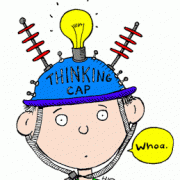How Kids Think, Feel, and Behave
Children’s brains are not fully developed (and won’t be until they are about 25 years old). This means that they do not solve problems like adults. Younger children tend to be:
- Concrete (“If Grandma died and went to up to heaven, then I could totally take an airplane to see her”)
- Impulsive (Karate-kick a houseplant)
- Inquisitive (“Would my dog like chocolate pudding?”)
- Magical-in-thinking (“If I think a tarantula is under my bed, then it absolutely is.”)
- Under-Informed (“Sponge Bob can see me through the television.”)
- Hypothesis-Testers (“What will mom do if I put my hand on the power outlet…again?”)
- Repetitious (“Anything worth doing once, should be done ten more times”)
- Distractible (Attention spans are limited, getting longer over time)
- Unreliable cause-and-effect understanding (“Mom and Dad got divorced because of me.”)
- Hyperactive (Most 3-year-old boys would meet criteria for a diagnosis of ADHD, but very few actually have it.)
- Imbue innate objects with sentience (“My stuffed animal needs a hug.”)
- Emotionally reactive (“Since I didn’t get ice cream, this is the worst day of my life.”)
With age, children’s reasoning becomes more sophisticated (but may not yet be rational). Then, bodily changes (including hormones and changes in neurochemistry) play a bigger role in the thoughts, feelings, and behaviors of older children. Older children tend to be:
- Convinced of their uniqueness (“No one has ever felt this way, and no one can ever understand me.”)
- Egocentric (“Everyone in the world is looking at my zit.”)
- Easily influenced (peer pressure)
- Peer-focused (social life is more important than family life)
- Variable in identity (try on different “selves” to answer critical questions about who I am, what I like, what I want to be)
- Rebellious (challenging social, familial, and cultural norms)
- Judicious (sensitive to “unfair” behaviors)
- Impulsive (Diving into a shallow pool)
- Under-Informed (starting a romantic online relationship)
- Emotionally reactive (a break-up is the end of life)
- Limit-testing (seeing how far parents’ rules can be bent)
For more information about normal childhood development, visit this website (it’s an offshoot of American Academic of Pediatrics):




